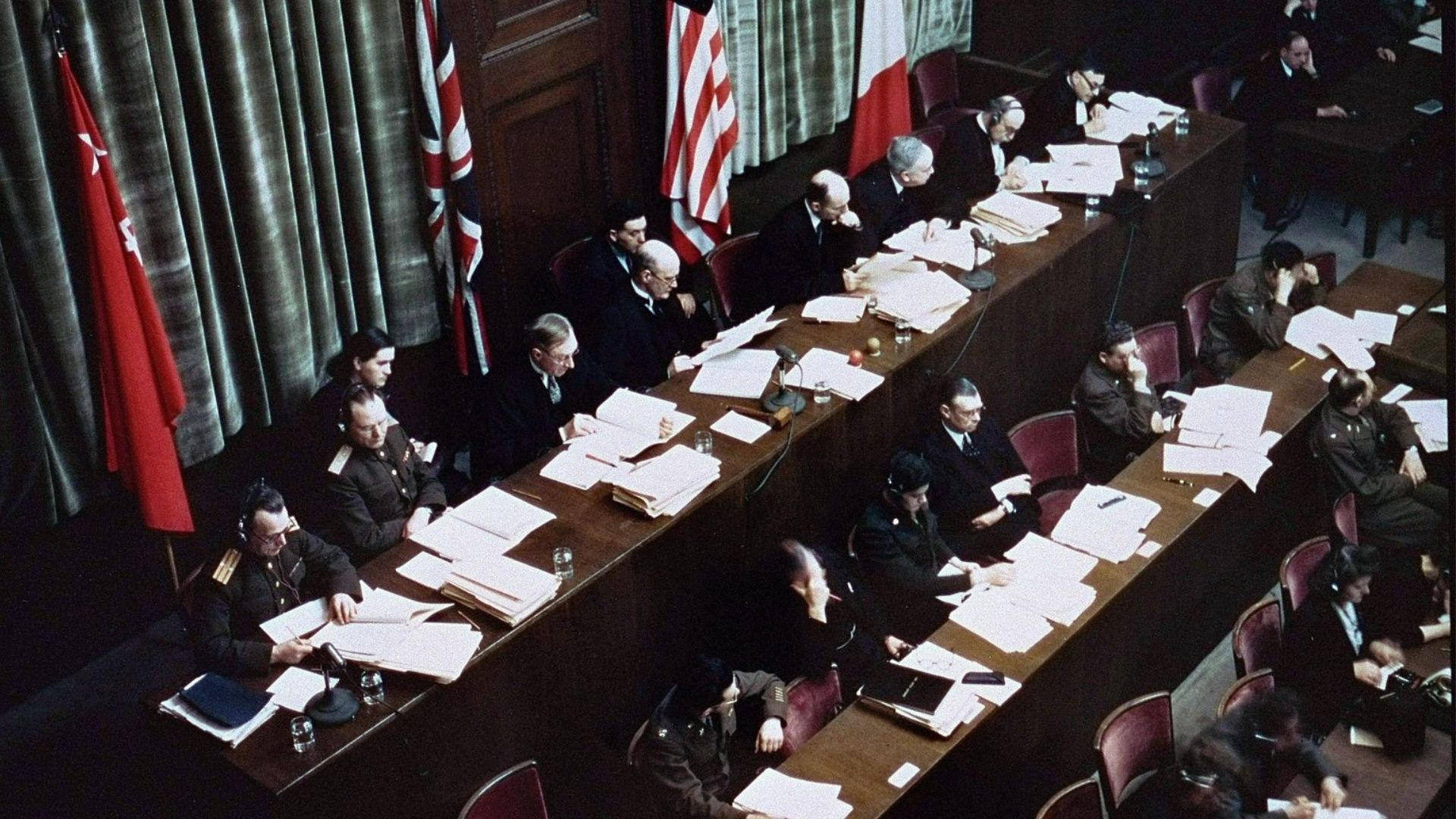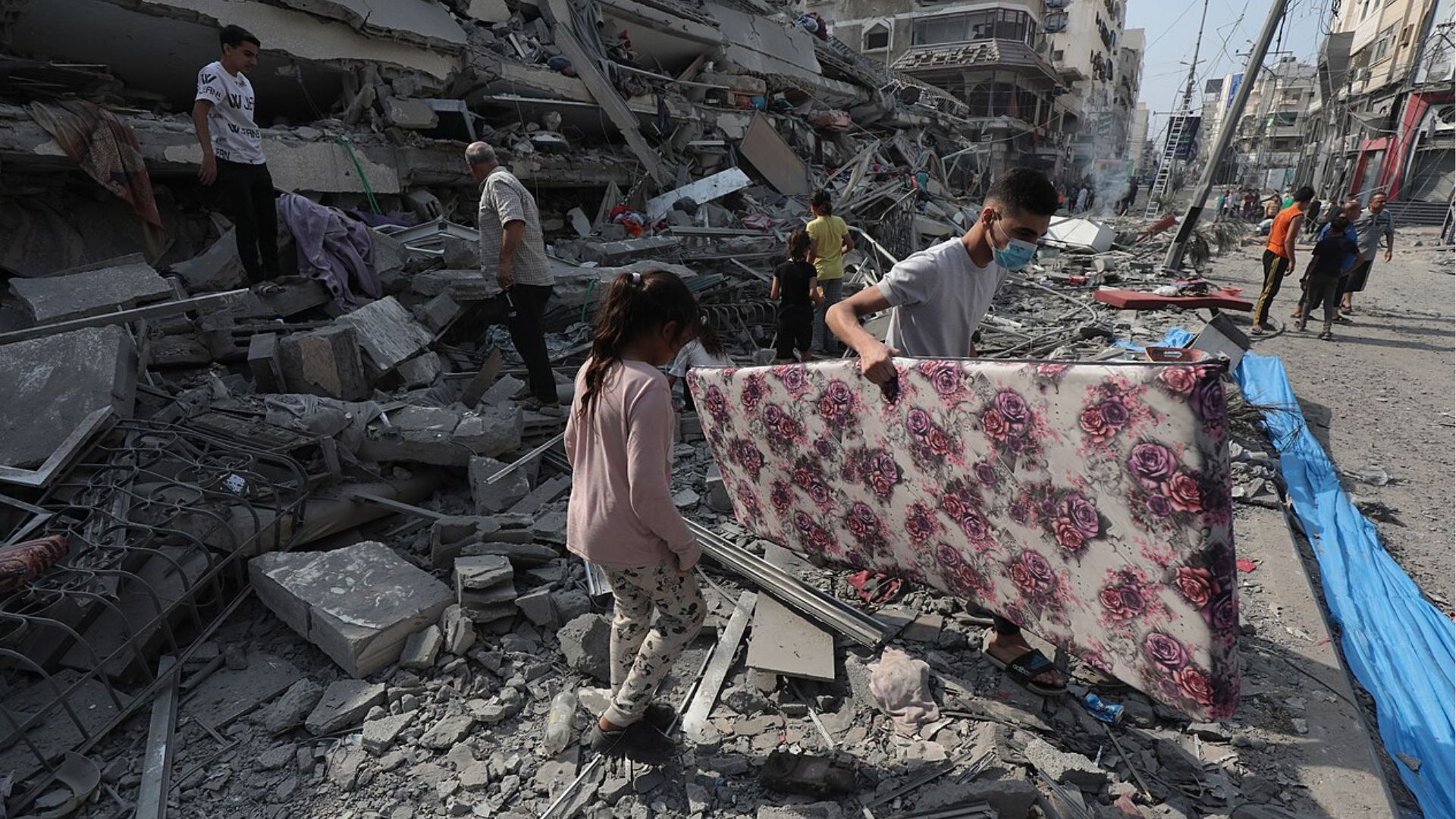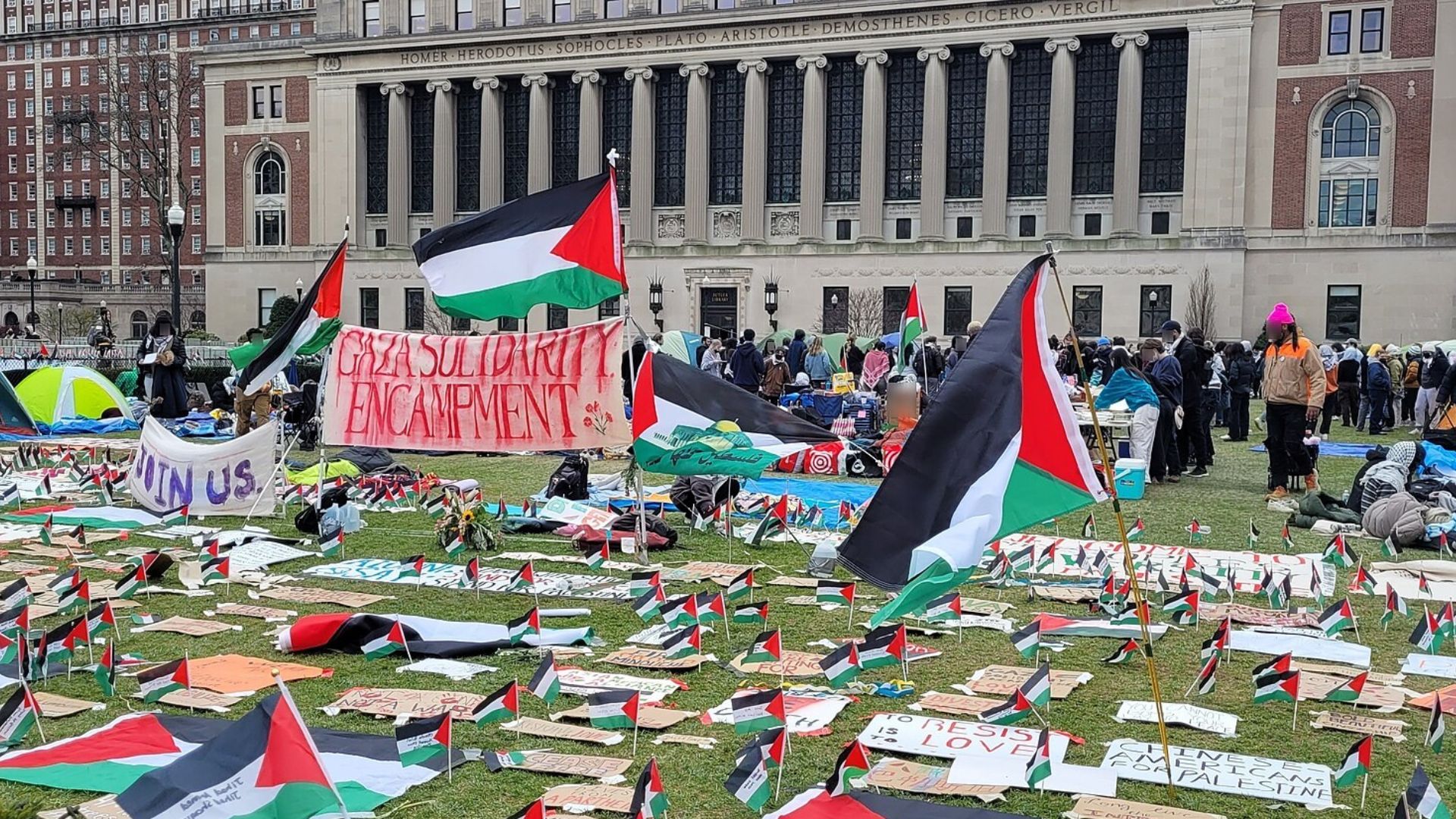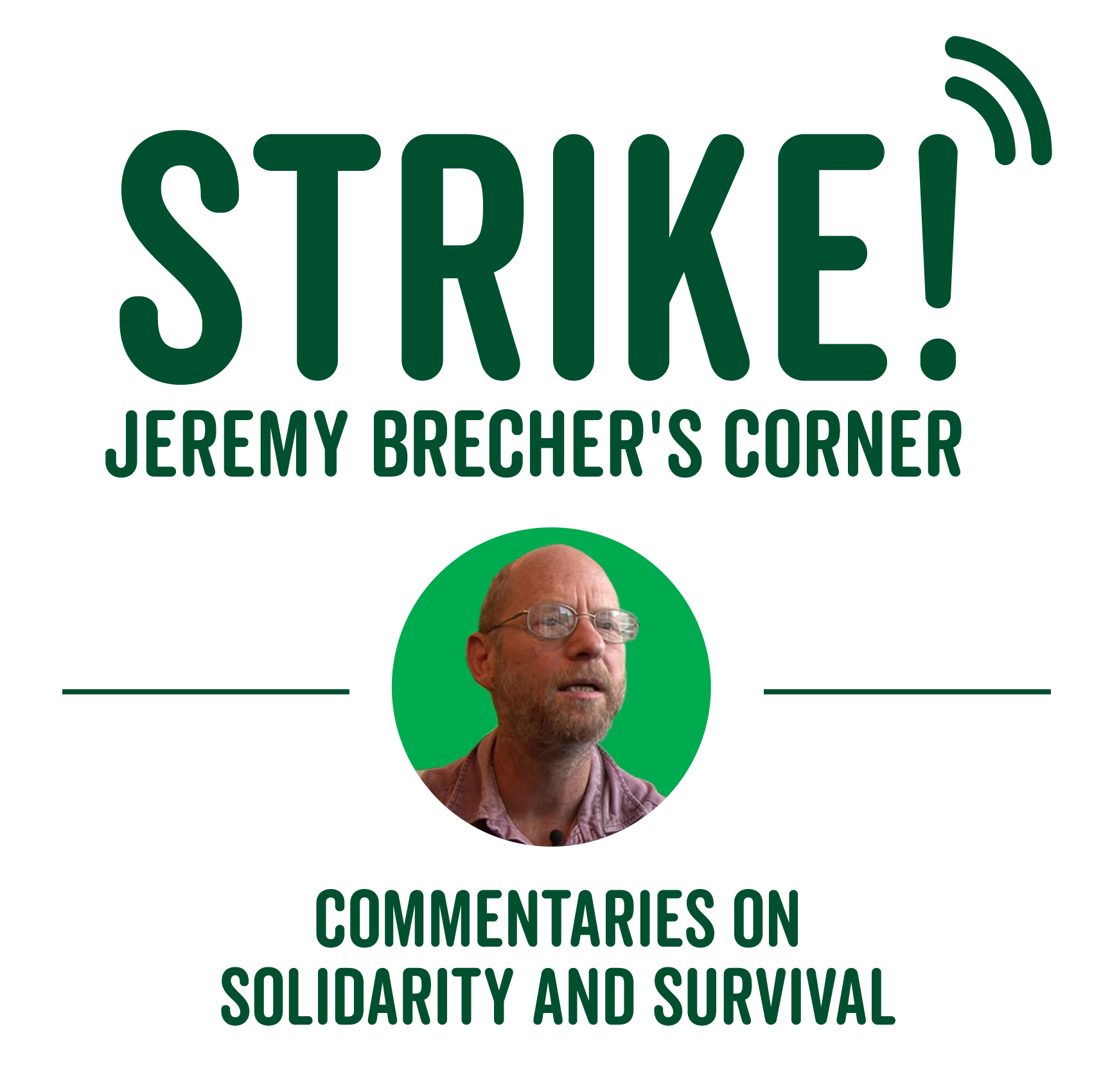Listen to the audio version >>
Are students who protest war and genocide in Gaza criminals? International law says no.
More than 2000 protestors have been arrested in pro-Palestinian demonstrations since mid-April. They have been charged with “criminal trespass” and other crimes. University officials, police, and politicians may say that students protesting Israeli genocide in Gaza and US complicity with it are criminals. But far from breaking the law, their actions are actually enforcing it. Here’s why.
The “Individual’s Obligation” to Halt War Crimes

In mid-1945, France, the Soviet Union, the United Kingdom, and the United States agreed to convene a joint tribunal in Nuremberg, occupied Germany, with the Nuremberg Charter as its legal instrument. Photo credit: Unknown Author, Wikipedia, Public Domain.
The Nuremberg Tribunal after World War II stated, “Complicity in the commission of a crime against peace, a war crime, or a crime against humanity” is “a crime under international law.”[1]
In the Zykon B case, the Nuremberg Tribunal found that “the provisions of the laws and customs of war are addressed not only to combatants and to members of state and other public authorities, but to anybody who is in a position to assist their violations.” In the Flick case the Tribunal ruled that international law “binds every citizen just as does ordinary municipal law.”[2]
This legal principle of citizen responsibility to resist war crimes is an essential part of the rule of law. When a government violates international law with impunity, it is up to its people to impose legal restraints on it. As Judge Bernard Victor A. Roling of the Tokyo War Crimes Tribunal explained, the world “has to rely on individuals to oppose the criminal commands of the government.”[3]
By virtue of the US Constitution, international law and international treaties are explicitly a part of U.S. law. US Supreme Court Justice and Nuremberg prosecutor Robert Jackson stated, “The very essence of the Nuremberg Charter is that individuals have international duties which transcend national obligations of obedience imposed by the individual state.”[4] So, obligations under international law are also obligations under US law.
Students who are protesting genocide and other war crimes in Gaza and US complicity in them are fulfilling their duty to oppose criminal acts of their government.
If it Quacks like a War Crime . . .

Palestinians inspect the ruins of Aklouk Tower destroyed in Israeli airstrikes in Gaza City on October 8, 2023. Photo credit: Palestinian News & Information Agency, Wikipedia CC Creative Commons
The Israeli assault on Gaza is the most visible genocide in history. The killing of more than 35,000 people, most civilians and many children, should be evidence enough. But there is also the deliberate starvation of the entire population; the bombing of electric and water infrastructure; and the destruction of homes, farms, and infrastructure.
The International Court of Justice has found that Israel’s actions in Gaza may constitute genocide in violation of international law. (Of course, they can’t issue a definitive ruling until they hold hearings and take defense statements — a process likely to take years.) The US district court for the Northern District of California, finding a credible case that Israel is committing genocide in Gaza and that the US is supporting its actions, declared, “It is every individual’s obligation to confront the current siege in Gaza.” [5]
When word leaked out that the International Criminal Court might be issuing war crime arrest warrants for Benjamin Netanyahu and other Israeli leaders, the US and Israel responded by threatening the court with unspecified “consequences” if arrest warrants were issued. That in itself may be another crime. As the International Criminal Court said in a statement, its independence and impartiality are undermined “when individuals threaten to retaliate against the Court or against Court personnel should the Office, in fulfillment of its mandate, make decisions about investigations or cases falling within its jurisdiction.” It added that the Rome Statute, which outlines the ICC’s structure and areas of jurisdiction, prohibits threats against the court and its officials.[6]
Protesting War Crimes Is No Crime

Scenes of the reinstated Gaza Solidarity Encampment at Columbia University on its fourth day. Photo credit: عباد ديرانية , Wikipedia Commons
Since the Vietnam war, arrested anti-war protesters have used international law as a basis for a “necessity defense” asserting that their actions were not crimes, but rather acts of citizen responsibility for preventing their government from committing war crimes. While courts have often disregarded such claims, at times juries have acted on them. For example, in 2003 Catholic Workers in upstate New York entered a military recruiting office and poured their own blood on the walls, the windows, the posters, cardboard mannequins of soldiers, the door, and the American flag to protest the Iraq war. They were charged with felony criminal damage to property. They said in court that their actions were legal under international law because they were trying to stop an illegal war. The jury deadlocked 9-3 in favor of acquitting them.
Students arrested for protesting US and Israeli war crimes in Gaza may well use such an international law defense in court. Whether or not courts will accept such a defense, they will make a powerful point in the court of public opinion: If our government is committing or is complicit in war crimes, we all have “international duties” to oppose the criminal acts of our government.
Will student demonstrations against US complicity in Israel’s genocide in Gaza have any effect? They are already helping force the Biden administration to take pause. According to news reports, US Secretary of State Antony Blinken recently told Netanyahu that “a major military operation” in Rafah would lead to the U.S. publicly opposing it and would negatively impact U.S.-Israel relations. When Netanyahu said the Rafah attack would go forward anyway, the Biden administration reportedly put a hold on a shipment of US-made ammunition to Israel.[7] US policy hangs in the balance, but there can be little doubt that the student demonstrators have shifted the balance away from war crimes and toward peace. That’s enforcing international law through citizen action.
In a world order in which the Great Powers and many lesser ones are turning to war and genocide, popular enforcement of international law is one of the few means for protecting ourselves and the world against a cataclysmic plunge into unlimited military destruction. In that context, student protest against war and genocide in Gaza is not just an expression of a political opinion, but an attempt to pull the world order back from its current careening to criminal wars, genocide, and catastrophe.
The declaration of the US district court for the Northern District of California that, “It is every individual’s obligation to confront the current siege in Gaza” has a message for the rest of us: Resistance to war and genocide is the obligation not just of the students, but of everyone.
[1] Jeremy Brecher, Jill Cutler, Brendan Smith, eds, In the Name of Democracy (New York: Metropolitan Books, 2005) p. 8. https://www.jeremybrecher.org/downloadable-books/inthenameofdemocracy.pdf
[2] Ibid, p. 245.
[3] Ibid, p. 285.
[5] Defense for Children International-Palestine, et al., Plaintiffs, v. Joseph R. Biden, et al., Defendants. https://ccrjustice.org/sites/default/files/attach/2024/01/91_1-31-24_Order-granting-MTD_w.pdf
[6] “ICC demands end to threats against court amid Gaza war probe,” Al Jazeera, May 3, 2024. https://www.aljazeera.com/news/2024/5/3/icc-calls-for-an-end-to-threats-against-the-court-as-war-in-gaza-rages-on
[7] Barak Ravid, “Scoop: US puts a hold on an ammunition shipment to Israel,” Axios, May 5, 2024. https://www.axios.com/2024/05/05/israel-us-ammunition-shipment-hold

